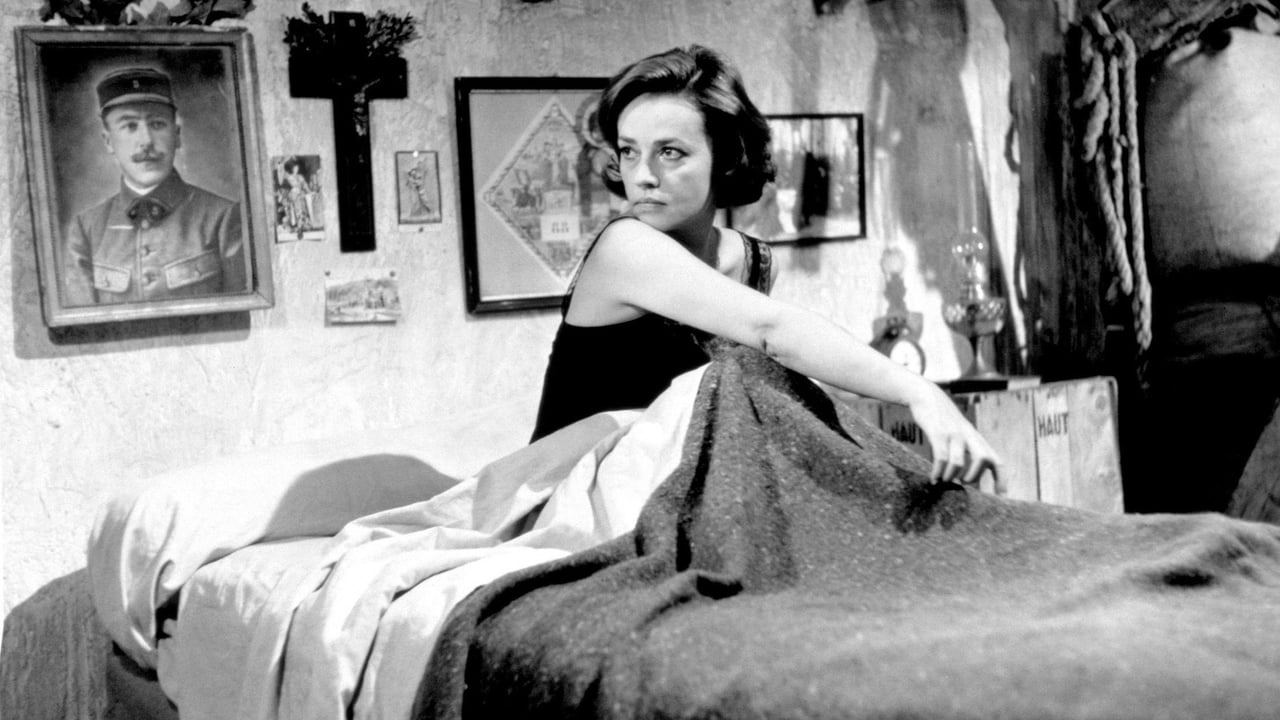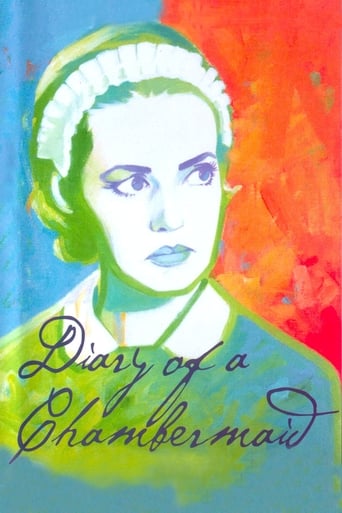

Who payed the critics
... View MoreFrom my favorite movies..
... View MoreThe movie really just wants to entertain people.
... View MoreStrong acting helps the film overcome an uncertain premise and create characters that hold our attention absolutely.
... View MoreIn the 30's, the witty, literate and quite sophisticated chambermaid Céléstine (Jeanne Moreau) comes from Paris to work for the dysfunctional Monteil family in the country, more specifically for the fetishist on shoes and maniac for cleaning Monsieur Rabour (Jean Ozenne). His daughter and mistress of the house Madame Monteil (Françoise Lugagne) is a frigid and arrogant woman, and her husband, Monsieur Monteil (Michel Piccoli), is a hunter and also a wolf with their maids. Their fascist and rude worker Joseph (Georges Géret) feels a sexual attraction for Céléstine, but she repels him. Their neighbor, Captain Mauger (Daniel Ivernel), has a problem with the Monteils and dumps his garbage in their yard, but Céléstine talks to him and is motive of gossips. When Monsieur Rabour unexpectedly dies, Céléstine quits her job but while in the train station, she finds that the girl Claire was found raped and murdered by the police. Céléstine returns to her job convinced that Joseph killed the little girl and trying to find evidences against him."Le Journal d'une Femme de Chambre" is a delightful movie of undefined genre drama, black comedy, adventure? where Luis Buñuel again exposes fight of classes, hypocrisy of both the bourgeois and the working class, a historical moment in France with the fascism growing, the ridiculous role of the clerical and an unsolved murder case. The story is centered in Céléstine, but the motives why a woman with her profile accepts a job in a rural area is never clear. The identity of the rapist and killer of Claire is also not disclosed, there is only a strong insinuation that Joseph killed the girl. The story is very ironic, like for example when Monsieur Monteil is informed that Céléstine and Joseph will marry and requires the sexual favors from Marianne; or the weird fetishism of Monsieur Rabour; or the priest asking for a new roof for the church to Madame Monteil; or the conclusion with Captain Mauger changing his will and serving the mistress and smart Céléstine on their bed. My vote is seven.Title (Brazil): "O Diário de uma Camareira" ("The Diary of a Chambermaid")
... View MoreLuis Bunuel directed this film right after "The Exterminating Angel", and before "Simon of the Desert". Working with his collaborator, Jean-Claude Carriere, Bunuel adapted Octave Mirbeau's novel, which by the way, had already been brought to the screen by Jean Renoir, years before this film went into production. This is what could be considered Luis Bunuel's most realistic work, as he tells a straight forward story with only slight detours into the realm of his beloved surrealism."Diary of a Chambermaid", which takes place at the end of the XIX century in the novel, is set in rural France in the early thirties. There is a rise in anti Jewish feelings as expressed by what the gardener and driver Joseph expresses himself without shame. Mr. Bunuel also makes fun at his own expense by having a local political figure condemn his earlier film "L'age d'or".Bunuel's target were always the bourgeoisie and the clergy. Both of them are represented in the movie by the Monteil's household and the family priest, who comes to the house and knows about Monsieur Monteil's sexual escapades. Celestine, the sophisticated Parisian chambermaid hired by Mme. Monteil sticks out like a sore thumb. She can give these provincials a lesson, or two, in how to conduct themselves. Mme. Monteil, a stingy woman, warns Celestine to be careful about cleaning an expensive lamp. She watches in horror as the new maid breaks it on the first day at the house as Celestine shows no remorse.Celestine is made the object of desire by the patriarch of the family, the older M. Rabour, who insist in getting the young woman as his personal maid. He also has something else in mind: he wants her to be a sort of dominatrix by insisting that Celestine wear the stiletto heeled boots for his benefit. The older man who swears he loves butterflies quickly kills them. Celestine, who quickly catches on, gets to learn all the secrets of the Monteils. At the end, Celestine emerges much stronger, and powerful than the people that hired her.Jeanne Moreau was the perfect choice for Celestine. She knew this woman inside out and gives a luminous performance as the maid. A young Michel Piccoli is also good as M. Monteil. Georges Geret's Joseph was perhaps his best role in which he speaks the unspeakable. Francoise Lugague and Jean Ozenne appear as Mme. Monteil and Monsieur Rabour.The Criterion DVD has a wonderful look. Roger Fellous' wonderful black and white photography has been lovingly restored. The film is perhaps one of Luis Bunuel's most accessible movies.
... View MoreI am surprised that the film has been often mentioned as Bunuel's minor film or even the closest to failure he'd come. I found it excellent - dark and cynical, funny and thought provoking. It's got everything I love Bunuel's films for sinister atmosphere, darker than dark humor, the strange characters living lives of sexual, religious, and social repressions. Jeanne Moreau, one of the greatest actresses France ever produced, as a titular chambermaid, Celestine adds to the film's many pleasures. Bunuel and his screenwriter Jean-Claude Carrière have transported the Octave Mirbeau's novel from the 19th century to the 1930s the epoch of Bunuel's first sojourn in France where he made his first two films. Celestine, a sexy and cool Parisian takes a job as a chambermaid to a bourgeois, provincial family with enough skeletons in the closet for a small cemetery. The irritable and arrogant wife is frigid, her husband (hilarious turn by Michel Piccoli) chases anything in skirt and her nice and well mannered father is a shoe-fetishist. There is also a neighbor, an ex-officer who hates Monteils and loves damaging and breaking his neighbors' things and property."Diary of a Chambermaid" (among many things) was able to show the absolute evil on the raise in the character of Joseph, the farm-laborer, who is sexually attracted to Celestine, a cruel, cold-blooded rapist-murderer and the fascist in such subtle yet scary way that Bertolucci should have watched and studied it for his "1900".
... View MoreLuis Buñuel, the man considered Spain's finest filmmaker and revered master of surrealism by both critics and film historians, made a surprising change of style in the first of the series of masterpiece she did in France during his last years. Taking out his usual surrealist set-pieces, he adapts Octave Mirbeau's revered novel about social classes in a very straight-forward fashion. However, this does not mean the movie is bad as many may believe; quite the opposite, "Le Journal d'eune Femme de Chambre" is a perfect showcase of Buñuel's finest film-making style, ambiguous and stylish, like the master's own vision of life.The plot follows Celestine (Jeanne Moreau), an urban young woman moving to country in 30s France to work as a chambermaid for the Monteils, a rich family with a few dark secrets. As soon as she arrives, problems start as she tries to adapt to her new life with the bizarre Monteils. Between the constant advances of sexually insatiable Monsieur Monteil (Michel Piccoli), the always vigilant eye of his materialist wife (Françoise Lugagne) and the shoe fetish of old Monsieur Rabour (Jean Ozenne); Celestine makes her way through this collection of living portraits of the most bizarre human nature.With a plot like this it would easy to believe this is a movie where the high class is demonized and the poor sanctified, but this is not the case here. Buñuel makes sure to have an ambiguity in every character, even in Celestine herself. There is no black and white, just different shades of gray, in a way similar to the beautiful black & white photography he uses here.The photography is essential in this film; not only for aesthetic purposes, it represents the dark decadent days of 30s Europe, and the pessimism latent in both rich and poor people. As I wrote above, the shades of gray match perfectly the ambiguity of a group of characters with as many virtues as flaws. Buñuel and his cast manage to create believable and realistic characters.Jeanne Moreau gives a brilliant performance as Celestine. As the beautiful young city woman highly intelligent and not without aspirations, her character has enough room to let her shine, and she really makes the most of it. Equally brilliant is Georges Géret as Joseph, the tough gardener with fascist ideals that has a secret agenda. The rest of the cast is also very good and together with the witty script complete a superb character-driven movie.Buñuel's masterful direction creates a film that, while completely focused on the characters, is still filled with his usual symbolism. The edition and the camera-work are superb and way the camera seems to flow inside the house gives the film a voyeuristic feeling. No wonder why Buñuel consider it a very erotic film.While many people consider this movie as one of his "lesser works", I consider it to be quite underrated, as it proved that Buñuel was a master not only of surrealism, but of film-making in general. 9/10
... View More